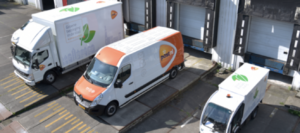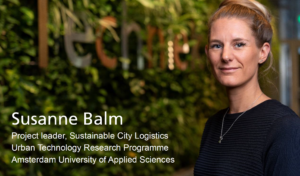Together with their suppliers and logistics service providers, the Dutch Amsterdam University of Applied Sciences (AUAS) and the University of Amsterdam (UvA) have worked five years on sustainable deliveries to their campuses. The result: an approach to sustainable logistics that can be scaled up to other large cities. The impact: fewer kilometers traveled by vehicles, more electric vehicles and more efficient handling of incoming goods.
A great deal of attention is paid to sustainable procurement of, for example, energy and means of transport, but little for the logistics of products and services purchased. Therefore in 2014, as a large purchasing organization in Amsterdam, the AUAS, started a study into the combined logistics footprint of UvA-AUAS. From this study, three possible types of solutions emerged: the bundling of goods at source, reducing numbers of delivery locations and changing purchasing policy and behavior. As a result, facility workers, researchers, 85 students and practice partners such as suppliers collaborated for five years, conducting research and implementing solutions.
Logistics hub for UvA-AUAS
One of the outcomes has been the establishment of a logistics hub on the outskirts of Amsterdam. Facility goods from five product groups, such as printing paper and coffee, are delivered there, bundled and then taken by electric vehicles to UvA-AUAS locations. This formula, achieved through collaboration between logistics hub Deudekom and the Dutch national postal service PostNL, has now been exported to other cities. In 2019 they together won a tender in The Hague to establish a hub, involve local logistics entrepreneurs and work together with more and more suppliers.
Fewer kilometers
With the implementation of the hub, the number of kilometers in the supply chains for deliveries to UvA-AUAS has been reduced by between 50,000 km and 100,000 km per year. In addition, electric vehicles – in line with the ambitions of the Dutch Green Deal for Zero Emission Urban Logistics – travel some 52,000 emission-free kilometers in the city annually. Wherever possible, criteria and preferences regarding sustainable transport are included in tenders for the supply of catering products and facility goods and services.
Efficient goods deliveries
To make transport in the city more efficient, 20 MyPup parcel lockers have been installed at UvA-AUAS locations. MyPup delivery workers deliver bundled private packages and business mail there so that the receiver can come and collect them. By bundling these kinds of deliveries, the number of deliveries to the door of different addresses was reduced by 15-20%.
“We are proud of the result,” says Susanne Balm, Project Leader in Sustainable Logistics at AUAS. “By involving all parties in the process, we brought together all the various business interests (facility management, knowledge development and the suppliers themselves). That can sometimes make it difficult to come up with solutions, but if successful, they are often solutions that stand the test of time. However, we are not finished yet. There are still many opportunities for the upscaling of solutions in the city. We are working on this in the CILOLAB project where – in addition to public-sector purchasers – we are also encouraging private-sector purchasers to make a difference.”
The full report with lessons learned from Amsterdam is available here.
Photo: Post NL


